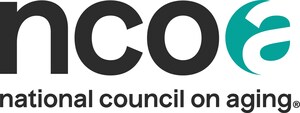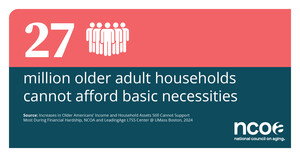Vote Ignores the Long-Term Care Needs of Millions of Seniors, Families, and Caregivers
WASHINGTON, Feb. 1, 2012 /PRNewswire-USNewswire/ -- The U.S. House of Representatives voted today to repeal the CLASS program, without offering any alternative to address the growing long-term care crisis among middle-class Americans.
(Logo: http://photos.prnewswire.com/prnh/20100615/NCOALOGO)
CLASS, or the Community Living Assistance Services and Supports program is a voluntary, fiscally responsible, long-term care insurance program that would help address the serious, growing long-term care needs of seniors, individuals with disabilities, caregivers, and families. CLASS was signed into law as part of the health reform Patient Protection and Affordable Care Act.
Millions of Americans are faced with a broken system that requires them to spend down their life savings into poverty before receiving needed long-term coverage, forces them prematurely into expensive nursing homes, and imposes enormous financial, emotional, and physical burdens on family caregivers, particularly women. The urgency to address these issues is growing, as almost 10,000 baby boomers turn 65 every day, and the fastest-growing segment of our population – those over age 85 – have the greatest need for these services.
"Killing the CLASS program without offering an alternative is irresponsible, ignores a growing problem, and lends credence to the view that too many members of Congress are out of touch with the struggles of middle-class American families," said Jim Firman, president and CEO of the National Council on Aging (NCOA).
For over two decades, Congress debated how to address long-term care before passing the CLASS Act last year. CLASS would encourage personal responsibility by providing a cash benefit to people needing care at home through voluntary premiums and, according to the Congressional Budget Office (CBO), would save Medicaid dollars.
"Repealing CLASS would likely delay serious efforts to address the need for long-term care reform for another two decades," added NCOA's Firman.
CLASS once had, and still deserves, bipartisan support, originally co-sponsored by former Sen. Mike DeWine (R-OH) when it was first introduced by the late Sen. Ted Kennedy. Other Republicans supported CLASS when the bill was considered in 2010 by the Senate Health, Education, Labor and Pensions Committee.
In fact, the proposal enjoys broad bipartisan support among the electorate. A Kaiser Family Foundation survey found that 76% of Americans support CLASS, including 69% of Republicans, 71% of Independents, and 87% of Democrats. In March of last year, NCOA also issued "The Top Ten Reasons Why Conservatives Should Love the CLASS Program."
There is also an alarming amount of misinformation about the funding and viability of CLASS, illustrated today by the Wall Street Journal editorial stating that: "CBO estimates CLASS would cost about $81 billion over a decade," when, in fact, CBO estimated it would SAVE about $81 billion.
While the CLASS Program is not perfect, NCOA believes it is a critical first step to build upon, and there are viable paths forward that would address various concerns. Actuaries have provided helpful recommendations for addressing so-called "adverse selection" concerns, so that premiums would be more affordable, participation rates would increase, and funding would be sustainable for the long-term, while protecting taxpayer dollars.
"We can improve CLASS to make it work, but only if the law stays on the books. Our view is mend it, don't end it," said Firman.
About NCOA
The National Council on Aging is a nonprofit service and advocacy organization headquartered in Washington, D.C. NCOA is a national voice for millions of older adults — especially those who are vulnerable and disadvantaged — and the community organizations that serve them. It brings together nonprofit organizations, businesses, and government to develop creative solutions that improve the lives of all older adults. NCOA works with thousands of organizations across the country to help seniors find jobs and benefits, improve their health, live independently, and remain active in their communities. For more information, please visit: www.ncoa.org | www.facebook.com/NCOAging | www.twitter.com/NCOAging.
SOURCE National Council on Aging
WANT YOUR COMPANY'S NEWS FEATURED ON PRNEWSWIRE.COM?
Newsrooms &
Influencers
Digital Media
Outlets
Journalists
Opted In






Share this article